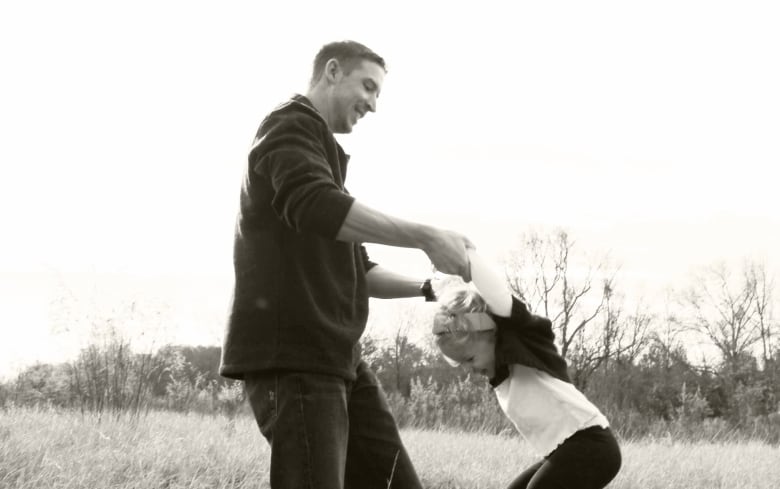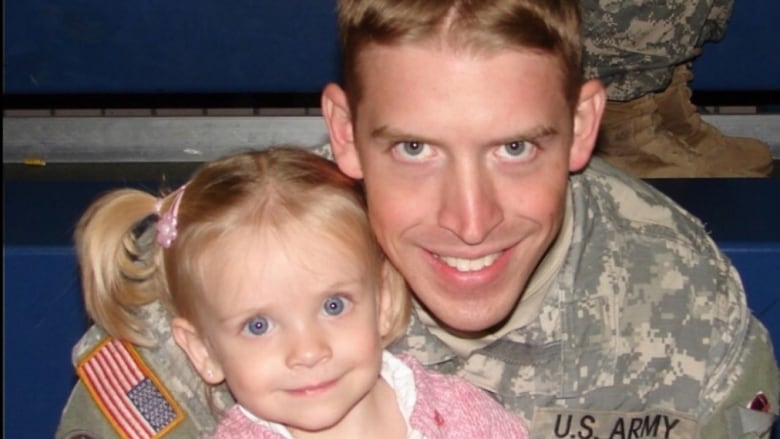Ontario woman fighting U.S. military for 'wrongful death' of ex-husband, an American soldier
Kate Kemplin is appealing after U.S. army denied her right to make claim originally filed in 2021

WARNING: This story contains references to suicide.
A Kingsville, Ont., woman is seeking damages from the U.S. military, arguing it was negligent and could have prevented the 2019 death by suicide of her ex-husband, an American soldier.
Kate Kemplin is a dual citizen who worked for the army in the 2000s, and has studied military suicide as well as traumatic brain injuries. Kemplin, who was married to Sgt. 1st Class Michael Froede, has filed two tort claims for damages on behalf of their two daughters.
"There's really no excuse for Michael to not be alive right now," she told CBC News.
The claim originally filed by Kemplin in June 2021 alleges Froede, who was on active duty assigned to U.S. Army Intelligence and Security Command, died in Baltimore "after several months of exhibiting documented symptoms ignored and dismissed by government medical providers and military command." He was 36.

The claim also argues proper treatment or intervention from Intelligence and Security Command would have prevented his death.
On March 17, the U.S. army denied her right to make the claims, stating the law doesn't allow for derivative claims, including those by family members or survivors "arising out of the circumstances of personal injury or death of a member."
Kemplin is in the process of appealing the decisions.
None of her allegations have been tested in court.
Kemplin and Froede married in 2004 and had two daughters together, later divorcing in 2013. The girls are now 12 and 15.
Kemplin, who is originally from Owen Sound, moved her family from the U.S. to Kingsville, Ont., in 2019, six weeks after Froede's death.
Hoping to set a precedent
Kemplin is seeking approximately $1 million US per year of service for each of her two children with Froede, a 20-year military veteran. However, she said, her actions are not about the money, and she wants to raise awareness while setting a precedent.
"They [the military] should be very embarrassed about how poorly they've handled suicides within their ranks, and hopefully, this will force a change and hopefully it'll empower other families to do the same," Kemplin said.

Froede's mother, Joanne Wolff, who lives in Albrightsville, Penn., with her other son, Alex, has also filed a $25-million wrongful death claim against the military. According to email correspondence between Wolff and the military, it has yet to reach a decision regarding her claim.
Their efforts are significant because historically, tort litigation was not allowed when directed toward military medical professionals.
Until 2021, because of a longstanding rule called the Feres Doctrine, it was extremely difficult for active-duty service members to hold the government liable for injury and death, even if military doctors' mistakes were involved. However, the National Defense Authorization Act 2020 allowed for a crack in that doctrine.
The act states claims can now be filed by an authorized representative on behalf of a service member who is deceased.
WATCH | Ohio psychiatry Prof. Craig Bryan explains why Kemplin's case stands out:
Gary Barthel, a managing partner at the Military Law Centre in California, said the original intent of the doctrine was to stop service members from suing a doctor who had to perform triage in a combat situation under non-optimal medical conditions.
He said cases like Kemplin's are "relatively new."
"I personally have not had any cases that fall under this."
CBC requested an interview with the U.S. army, but received an emailed statement instead.
Army spokesperson Matt Leonard wrote that 18 wrongful death claims have been brought forward since the act came into effect, but settlements have yet to be reached.
He also said, "People are our No. 1 priority, and we want soldiers, veterans and their families to know how to reach 24/7 help."
The investigation into Froede's death
In the months leading up to Froede's death, Kemplin said, Froede, who also had a documented brain injury he acquired while serving in Iraq in 2007, had been exhibiting severe mental health symptoms, became increasingly paranoid and articulated his plans for his death to a colleague.
WATCH | Nurse scientist Kate Kemplin explains hard decision to move on tort claims:
She said that after his death, she was debriefed by commanders and lawyers for the military, and she alleges they admitted fault.
"Essentially, Michael was a spy for the United States army, working with some very sensitive three-letter agencies. And they let him roam around the D.C. area psychotic and paranoid with a very tenuous grasp on reality with national security secrets in his head. It defies logic. And they knew and they did nothing," according to Kemplin.
"They literally sent him home to die."
Froede signed out to go on leave four days before he died. According to the investigation report into his death that was conducted by the U.S. army, the reason cited for being on leave was to spend time with his daughters.

When he died, Froede was an active duty army human intelligence collector assigned to U.S. Army Communications Technology Research Activity in Washington. The investigation noted he had a history of anxiety and depression dating back over a decade, according to the army's report, which Kemplin shared with CBC News.
The report includes a number of sworn statements from colleagues whose names were blacked out that describe shifts in Froede's personality, deterioration of his mental health and heightened paranoia in the months leading up to his death.
Some colleagues noted they were concerned Froede might consider suicide, some urged supports and others noted he had been seeing a behavioural health professional, which seemed to be helping.
According to the report, his last contact with a behavioural health provider was at the Barquist Army Health Clinic near Baltimore, five days before he died. The report stated there was no indication of any acute safety concerns at that time and he had been deemed "not to be an elevated risk of harm to self or others."
The report also stated, "SFC Froede was well trained in providing a front to those closest to him and time and again, even when asked, he stated he was no threat to himself or others."
'Our family is broken': Late soldier's mom
Kemplin argues the investigation report makes it clear that military members were aware Froede was dealing with serious issues and they had a duty to step in, but failed to rescue him.
Froede's mother demands more action to prevent suicides in the future.
"My heart is broken," Wolff said. "Our family is broken. We may never get back together. We may never be a family again."
Wolff told CBC she's angry and has felt ignored by the military since her son's death.
"Michael was very needed at his job. He's one of the few people who could do it," she said.
"They rode a good horse to death. They literally did. They worked him until he broke. And they knew he had issues and they didn't address them at all."
None of her allegations have been proven in court.
Suicides in the military
According to the 2020 U.S. Department of Defence annual suicide report, 580 service members died by suicide that year. The rate among active service members was 28.7 per 100,000 in 2020, up from 20.3 per 100,000 recorded in 2015.
In the Canadian Armed Forces (CAF), there's been no significant increase in the suicide rate of regular members in recent years, according to a recent report. Between 2015 and 2019, there were 69 suicides among male service members, at a rate of 24.5 suicides per 100,000, compared to 24.2 suicides per 100,000 from 2010 to 2014.
Michel Drapeau, a retired colonel who practises military law and teaches at the University of Ottawa, explained that lawsuits or tort claims filed by family members against the Canadian military are "very, very rare," as the process is usually long and expensive.
He added that while there's a system to investigate a military suicide in the Armed Forces, families don't get enough supports to navigate the aftermath.
"If it's a non-combat death, normally the family is left basically in the lurch," Drapeau said.
WATCH | Retired colonel Michel Drapeau says getting closure for family can take years:
CBC requested an interview with the Armed Forces that was declined.
But in an emailed statement, an Armed Forces spokesperson said the CAF Is "committed to working with its partners to ensure that our personnel and their families have access to the resources they need," and it has an extensive mental illness awareness and suicide prevention program.
Taking time to heal
In Kemplin's case, this process is part of her family's healing.

Her daughters are doing well, though it's been a traumatic and emotional experience.
"The ripple effects from a service member suicide is unbelievable," she said.
Kemplin described Froede as a fighter, and a funny and smart man who loved his daughters tremendously.
She told CBC News she has no intentions of giving up on her legal proceedings, despite the latest denial of her claims.
"Hopefully families in the future won't have to fight the behemoth that is the United States army to receive fairness especially in the face of such a wrongful death," she said.
If you or someone you know is struggling, here's where to get help:
-
Canadian Veteran Crisis Line: 1-800-268-7708.
-
Canada Suicide Prevention Service: 1-833-456-4566 (phone) | 45645 (text).
-
US Military Crisis Line: 1-800-273-8255, option 1, or by texting 838255.
-
Canadian Association for Suicide Prevention: Find a 24-hour crisis centre.
This guide from the Centre for Addiction and Mental Health outlines how to talk about suicide with someone you're worried about.


